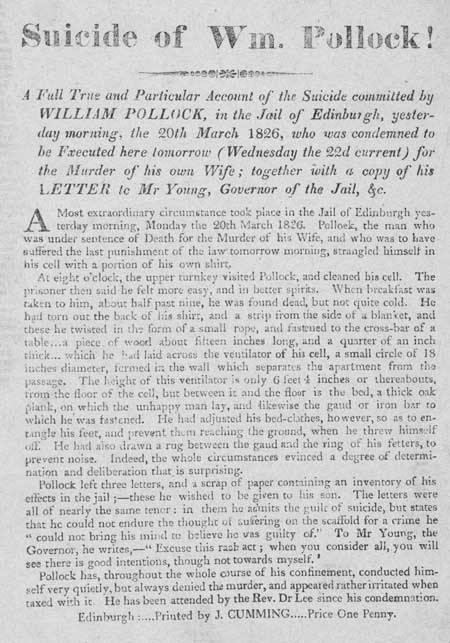Transcription
Suicide of Wm. Pollock ! A Full True and Particular Account of the Suicide committed by
WILLIAM POLLOCK, in the Jail of Edinburgh, yester-
day morning, the 20th March 1826, who was condemned to
be Fxecuted here tomorrow (Wednesday the 22d current) for
the Murder of his own Wife; together with a copy of his
LETTER to Mr Young, Governor of the Jail, &c. A Most extraordinary circumstance took place in the Jail of Edinburgh yes-
terday morning, Monday the 20th March 1826. Polloek, the man who
was under sentence of Death for the Murder of his Wife, and who was to have
suffered the last punishment of the law tomorrow morning, strangled himself in
his cell with a portion of his own shirt. At eight o'clock, the upper turnkey visited Pollock, and cleaned his cell. The
prisoner then said he felt more easy, and in better spirits. When breakfast was
taken to him, about half past nine, he was found dead, but not quite cold. He
had torn out the back of his shirt, and a strip from the side of a blanket, and
these he twisted in the form of a small rope, and fastened to the cross-bar of a
table...a piece of wood about fifteen inches long, and a quarter of an inch
thick... which he had laid across the ventilator of his cell, a small circle of 18
inches diameter, formed in the wall which separates the apartment from the
passage. The height of this ventilator is only 6 feet 4 inches or thereabouts,
from the floor of the cell, but between it and the floor is the bed, a thick oak
plank, on which the unhappy man lay, and likewise the gaud or iron bar to
which he was fastened. He had adjusted his bed-clothes, however, so as to en-
tangle his feet, and prevent them reaching the ground, when he threw himself
off. He had also drawn a rug between the gaud and the ring of his fetters, to
prevent noise. Indeed, the whole circumstances evinced a degree of determi-
nation and deliberation that,is surprising. Pollock left three letters, and a scrap of paper containing an inventory of his
effects in the jail ;?these he wished to be given to his son. The letters were
all of nearly the same tenor : in them he admits the guile of suicide, but states
that he could not endure the thought of sufering on the scaffold for a crime he
" could not bring his mind to believe he was guilty of." To Mr Young, the
Governor, he writes,?" Excuse this rash act; when you consider all, you will
see there is good intentions, though not towards myself. Pollock has, throughout the whole course of his confinement, conducted him-
self very quietly, but always denied the murder, and appeared rather irritated when
taxed with it. He has been attended by the Rev. Dr Lee since his condemnation. Edinburgh :....Printed by J. CUMMING.,.....Price One Penny.
View Commentary | Download PDF Facsimile
|
 |
Date of publication:
1826 shelfmark: L.C.Fol.74(397)
 View larger image
View larger image
|


